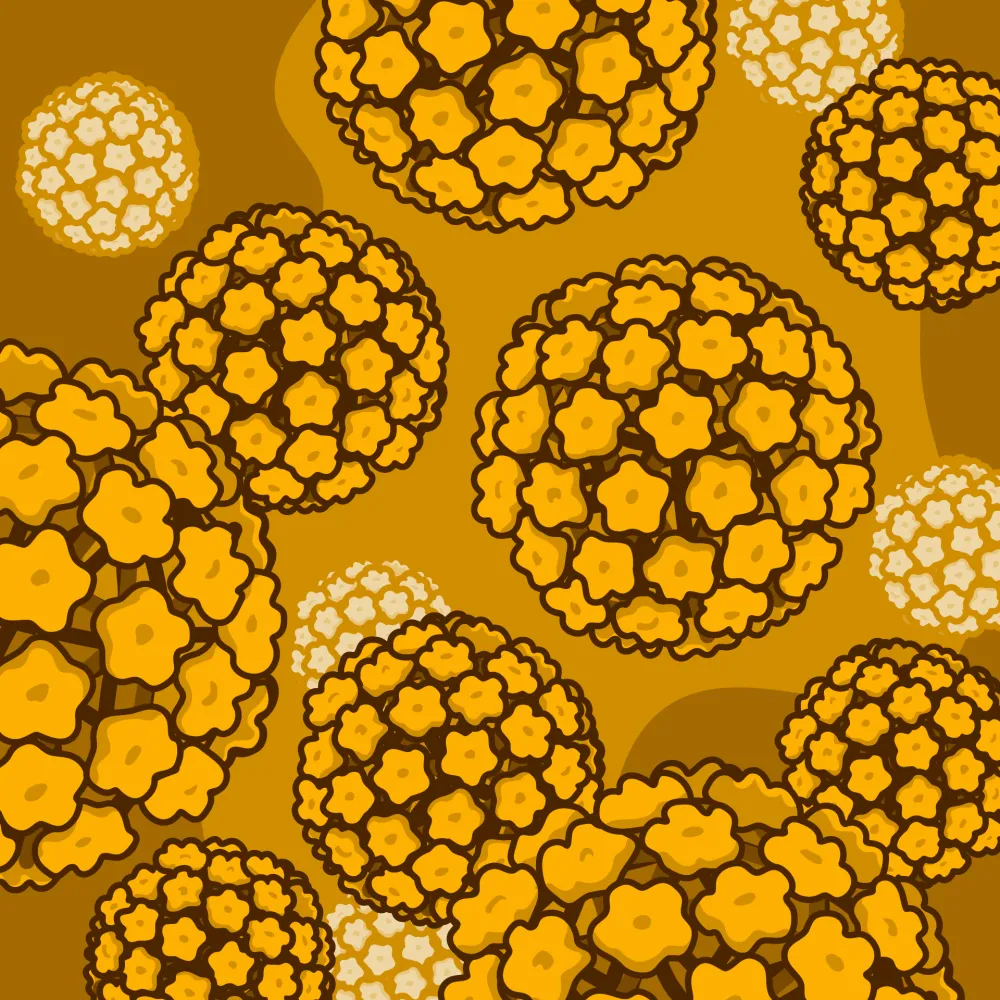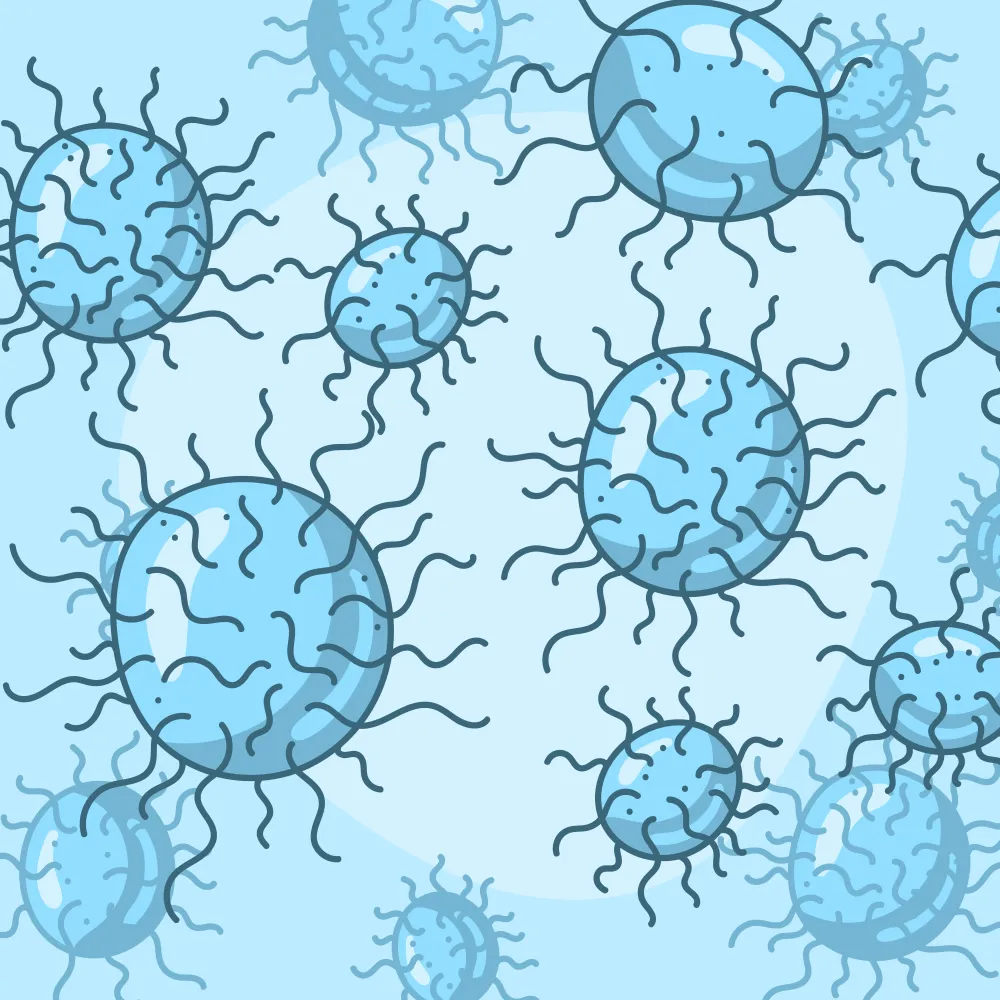At Freddie, we want to give everyone the tools they need to have safer sex. That means friendly, judgment-free information about taking care of your health – including STIs. Read on for our guide to genital herpes.
What is genital herpes?
Genital herpes is a very common sexually transmitted infection (STI). It’s caused by the Herpes Simplex Virus (HSV).
There are two types of HSV: HSV-1, which mostly affects the mouth/throat/nose and is known as oral herpes or “cold sores”, and HSV-2, which mostly affects the genitals and/or anus. However, HSV-1 can also be transmitted to the genital area and you can still get HSV-2 orally.
Most people with genital herpes will have no symptoms. If you have symptoms, it is easy to test for by taking a swab from a blister or lesion. There are blood tests available for HSV, but these aren’t often used because they give limited information (see below).
There is no cure for HSV, but it can be managed with antiviral medication to reduce the severity and length of outbreaks. Medication can also lower the risk of passing it on to others.
What are the symptoms of genital herpes?
Most people with genital herpes will not have symptoms. When symptoms do occur, they usually show up two to 12 days after you’ve been exposed and resolve in around 14 days.
The primary symptom is herpes lesions or sores. These progress through the following stages:
- Tingling, itching, burning or painful skin
- Red bumps
- Blisters (single or in clusters)
- Ulcers, formed when blisters break open and ooze fluid
- Scabs, formed as ulcers heal over
Other symptoms of a genital herpes outbreak include:
- Pain when peeing
- Genital discharge
- Swollen lymph nodes
- Flu-like symptoms (fever, headache, fatigue, muscle ache)
The first outbreak after being exposed to HSV is usually the most severe. After this, the virus stays in your body but you won’t have symptoms until your next outbreak. Repeat outbreaks are usually shorter and the symptoms are less severe.
Repeat outbreaks may be triggered by stress, illness or other factors affecting your immune system. The amount of time between these can vary a lot - for some people, it may be years before they have symptoms again. Others may only ever have one outbreak.
How is genital herpes transmitted?
HSV of both types affects mucous membranes. These are moist, warm body parts like your genitals, mouth and rectum. The most common way it’s transmitted is through sex without a barrier - so oral, vaginal or anal sex without a condom or dental dam.
HSV can also be transmitted on shared sex toys or on someone’s hands, if they touch a lesion or have bodily fluids on them and then touch someone else’s genitals.
Condoms are an effective way to reduce risk for HSV transmission, but they won’t prevent all skin-to-skin contact. If someone has a herpes sore that isn’t covered by a condom or dental dam, then they can still transmit the virus. HSV can also be transmitted even when someone has no symptoms – in fact, most transmissions happen this way.
You can transmit HSV from the body part where you have or have had outbreaks to someone else. So, if you have oral herpes and perform oral sex on someone you can give them genital herpes. You can also transmit HSV between your own body parts – for example, if you have an oral herpes outbreak and touch your mouth before touching your genitals.
In some cases, HSV can also affect body parts like fingers. This can happen if you have broken skin and these come into contact with a herpes sore.
How is genital herpes treated?
Genital herpes cannot be cured, but it can be managed with medication. Oral antivirals like acyclovir, famciclovir or valacyclovir can reduce the length and severity of outbreaks. You take these medications every day, and they must be started at the first sign of symptoms. Your clinician can advise you on how long to take these for.
Some people who get frequent outbreaks will take antivirals every day to help suppress the virus. This can also lower the risk of transmitting HSV to partners.
How do you prevent genital herpes?
STIs are a fact of life for anyone who has sex, and the only way to completely avoid them is to not have sex. This just isn’t realistic for most people, though! Here are some ways to reduce risk for genital herpes when you have sex.
Condoms
Barrier methods like condoms and dental dams can help prevent genital herpes. They don’t prevent all skin-to-skin contact, though, so transmission is still possible – especially if someone has a herpes sore that isn’t covered.
You need to use condoms the entire time when you’re having sex, and you also need to use them for every type of sex. If you use them for some but not others, like oral sex, then there is still a transmission risk.
Condoms should also be used on toys if you’re sharing them, and should be replaced whenever you switch holes (so if you change between anal and vaginal use, even on yourself) or change partners.
Suppressive treatment
If someone has genital herpes, then taking daily antivirals can help prevent outbreaks and reduce the risk of transmitting the virus to new partners. This doesn’t completely eliminate risk, but it can help lower it. Some people will start suppressive treatment for one to two years and then switch to outbreak-based treatment if they have no symptoms during that time.
I’ve been exposed to genital herpes. What should I do?
Genital herpes is usually only tested for if someone has symptoms. Your clinician will take a swab from a lesion and send this for testing to confirm the presence of HSV. They may also be able to diagnose just from looking at your sores.
HSV can be detected with a blood test, but this isn’t often used because it does not tell where you have the infection (oral or genital). It also does not tell the difference between an active or a long-term infection. Because HSV is so common and many people would have a positive blood result without ever showing symptoms, most providers will not do these tests.
If a partner has told you they have genital herpes, then watch for symptoms over the next 12 days. If you start to get symptoms, avoid sex and follow the steps in the section below.
I have symptoms of an STI. What should I do?
If you start to have any symptoms of genital herpes like blisters in your genital or anal area, visit a healthcare provider right away. You can visit a sexual health clinic in walk-in hours or book an appointment with them, depending on their policy.
A provider should be able to diagnose you in your appointment if you have visible lesions. They may swab these to send off for tests to confirm this diagnosis, and will be in touch when results are back. They can prescribe antiviral medication to help manage the outbreak and any future ones you may have.
You can get testing and treatment for STIs at sexual health clinics, family doctors, public health clinics, walk-in clinics, and some community health centres.
I was diagnosed with genital herpes. What now?
If you’ve been diagnosed with genital herpes, do not have sex until your sores have healed and all other symptoms have resolved. Your clinician can give more specific guidance about how long to wait before resuming sexual activity. You can still transmit the virus after your symptoms have cleared, but condoms and/or antiviral medication can reduce this risk.
If you are diagnosed with an STI then you’ll need to tell recent partners so that they can receive testing and treatment if they need it. If you don’t feel comfortable reaching out to a partner directly, then there are services available to send an anonymous text to someone saying they’ve had an STI exposure. However, if you’re the only person that your partner is having sex with then they will know the message is coming from you.













